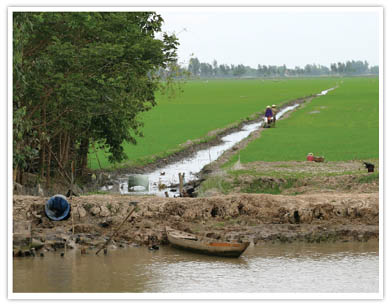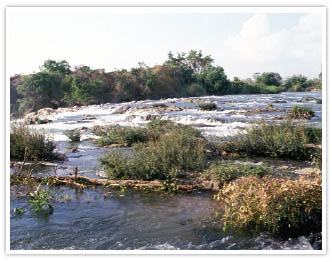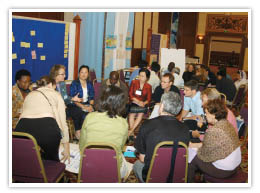Progress Report 2006
Agriculture, Irrigation and Forestry Programme
The goals of the MRC's Agriculture, Irrigation and Forestry Programme (AIFP) are to ensure that sound watershed management will preserve the watershed functions for the future; to develop improved irrigation and water use methods and to engage in research on the best methods for monitoring land-use changes and complete important baseline studies on watershed management, forestry and land use planning.
The AIFP completed its first phase in December 2005. Formulation of new AIFP programme document for 2006-2010 is in process, but work is continuing. At present AIFP is conducting activities based on two components: the Watershed Management Component and the Water Use Efficiency Component.

Under these two components, AIFP currently operates four projects:
- The Watershed Management Project (WSMP) executed by GTZ.
- Demonstration of Multi-functionality on Paddy Fields (DMPF)
- Improvement of Irrigation Efficiency on Paddy Fields (IIEPF)
- The Challenge Programme on Water and Food (CPWF),
Watershed Management Component The Watershed Management Project
The Watershed Management Project (WSMP) running under the Watershed Management Component (WSMC) aims at institutionalising watershed management in the MRC Member States.
The objective of this component is that “national and local institutions increasingly and more competently consider the maintenance of watershed functions in their land-use related activities”. This will lead to an enhanced capability of the MRC Member States to manage their watersheds sustainably and increasingly in view of national and regional needs.
In 2006 the WSMP held a series of consultations with the Member States to identify and formulate more detailed activities for the second phase of its project. During this phase the project will focus on policy analysis, information management and capacity building activities.
A Joint Working Group Meeting was organised in Khon Kaen in March to draft and agree on the work plan for 2005- 2008 and a draft WSMP Programme document was formulated. Resulting from the meeting in Khon Kaen, the project conducted its first policy analysis studies as well as capacity needs assessments for watershed management in Lao PDR, Cambodia and Viet Nam , followed by the preparation of an extensive capacity building outline for the next two years. A process design for the introduction of a results-based monitoring system in the WSMP/MRCS has been initiated.
Within the framework of Information Management the project maintains and develops the MekongInfo information website which hosts a diverse range of information and research concerning the Mekong River Basin.
The project also assisted the MRC's Technical Services Division with developing the Information and Knowledge Management Programme.
During 2006 the project continued to work on a Watershed Management Resource Kit which includes the development, documentation and dissemination of watershed management approaches for selected watersheds. This kit will be published in early 2007.
The WSMP also helped to improve regional data, information and knowledge management, through a variety of training programmes.
This component is funded by the Government of Germany.
The Water Use Efficiency Component
This component aims at developing irrigation and agriculture in a sustainable manner taking into account the requirements of a healthy river system by the relevant institutions. The Government of Japan is funding two projects: Demonstration of the Multi-Functionality of Paddy Fields (DMPF) and Improvement of Irrigation Efficiency on Paddy Fields (IIEPF) to address the issues of water use efficiency of irrigated agriculture under this component.
The programme has developed strong links with both national counterparts and international partners such as the Food and Agriculture Organisation and the Challenge Programme on Water and Food.
Demonstration of Multi-functionality of Paddy Fields (DMPF)

In 2006 the major achievements of the Project to Demonstrate Multi-functionality of Paddy Fields (DMPF) include the completion of the project report in January 2006.
The final report on Data Collection for the Project to Demonstrate Multi-functionality of Paddy Fields over the Mekong River Basin by Cambodia was also completed. Final reports on data collection from four Member States have now been submitted and an analysis of selected functions of paddy fields has been identified in Thailand and Viet Nam.
The Japanese donor, Ministry of Agriculture, Forestry and Fisheries of Japan (MAFF), agreed with the planned activities of DMPF and approved an extension of the project until November 2007.
The project also sponsored staff from the MRC Secretariat and relevant Line Agencies to attend and participate in the 4th World Water Forum held in Mexico City in March 2006.
Improvement of Irrigation Efficiency on Paddy Field (IIEPF)
In 2006 the Improvement of Irrigation Efficiency on Paddy Fields over the Mekong River Basin project (IIEPF) held its first regional workshop to finalise the project document, and discuss the outline of the forthcoming activities under the project. The project document has now been finalised and approved by the donor.
The project came to an agreement on collaboration with the FAO, whereby the FAO would provide technical comments through participation in workshops; teach country participants the Rapid Appraisal Process (RAP) irrigation scheme appraisal technique through RAP training workshop and on-the-job training; and identify appropriate consultants to draft guidelines for efficient water use.

The International Forum on Water and Food,
held in
Vientiane, Lao PDR, drew delegates from river basins
around the world.
A four-day RAP training workshop was held in July at the Secretariat in Vientiane. RAP is a tool to allow qualified engineers to systematically and quickly determine key indicators of how an irrigation project is performing. The tool was developed by FAO and FAO staff conducted the training of around 20 engineers from the Member States. These trained engineers have conducted irrigation scheme appraisal as a part of IIEPF field observation.
In late 2006 subcontracts for fieldwork were concluded with the four Member States. Initial meetings were conducted with NMCs and Line Agencies in November and December to confirm the details of planned fieldwork. Fieldwork started in the 2006/2007 dry season and will continue to cover the next wet season in all the member countries.
CGIAR Challenge Program on Water and Food
The CGIAR Challenge Programme on Water and Food (CPWF) is also placed under this component. The CPWF is an initiative of the Consultative Group on International Agricultural Research (CGIAR) and is a research-fordevelopment programme that operates through a global network of partnerships. It seeks to develop innovative ways of producing more food with less water across nine “benchmark river basins” in the developing world, including the Mekong.
The MRC is the coordinating institution for CPWF projects in the Mekong River Basin, where it monitors the activities of some 10 projects of various sizes. In addition, the MRC is represented on the CPWF Steering Committee, and the AIFP Research Coordinator sits on the CPWF Management Team Four CPWF Small Grants for Impact projects, each worth about US$ 75,000, have been contracted and now fall under the purview of the MRC Research Coordinator. In 2006 Ttwo additional, major projects (each worth more than US$ 1 million) were also contracted and held their inception workshops in 2006.
The first of these is CPWF Project No. 11, entitled “Rice Landscape Management for Raising Water Productivity, Conserving Resources and Improving Livelihoods in Upper Catchments of the Mekong and Red River Basins”. The second, CPWF Project no. 25 is entitled “Companion Modelling for Resilient Water Management: Stakeholders' Perceptions of Water Dynamics and Collective Learning at the Catchment Scale”.
Both have now been have been contracted and held their inception workshops in 2006.
The CPWF Basin Focal Project (BFP) is progressing well, and aims to develop water poverty and water productivity maps and data for the Mekong River Basin. The MRC is a partner in this initiative.
In May 2006, the CPWF held its steering committee meeting in Cairo, where the AIFP Research Coordinator represented the MRC. The MRC's AIFP Research Coordinator continues to be an active member of the CPWF Management Team. In November 2006, the CPWF held the International Forum on Water and Food in Vientiane, Lao PDR. The MRC hosted this event, which attracted approximately 250 delegates from around the world and was considered extremely innovative effective.
Choose a newsletter: